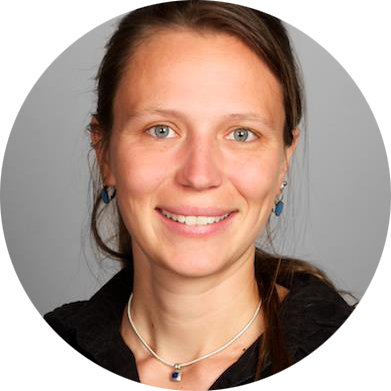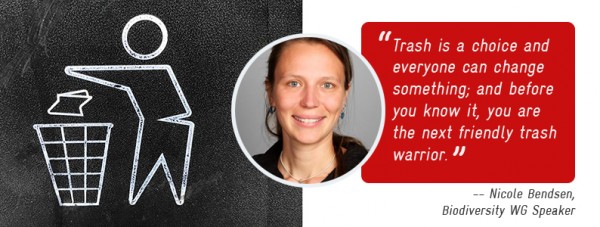In 2018, LET’S LIVE WITH LESS TRASH! An interview with Nicole Bendsen by Mach Fabe
For 10 months now, Nicole Bendsen, Biodiversity Working Group Speaker and Chief Advisor of the COSERAM programme, has been living a zero-waste lifestyle. We hope she will inspire you to do the same in 2018. Let’s all make the zero-waste lifestyle one of our New Year’s resolutions!
What does it mean to live with “zero waste”?
The bottom line is to send as little as possible to the landfill, by refusing what you do not need; reducing what you do need; reusing what you consume; recycling what you cannot refuse, reduce, or reuse; and rotting (composting) the rest.
What made you decide to go zero waste?
I grew up in an eco-friendly household, so my awareness of mindful consumption was awoken at an early stage and accompanied me throughout my life. One main trigger to my becoming more consistent in my efforts to cut my waste was when I encountered the vast amounts of ocean litter while diving through underwater wonderlands here in the Philippines. This very vividly showed me how big the problem really is. I guess everyone has seen the pictures of dissected birds or marine animals; heard the projection that in 2050, our oceans will contain more plastic than fish; or read about the health threats of microplastics.
My real Aha! moment, however, was when friends shared with me that they are living with zero waste, here and now. It left me without excuses for postponing the endeavor.
What is the most difficult part of living with zero waste?
I have a very individual answer for this. At first, I was able to reduce my waste related to most food items quite quickly. Breakfast was, and still is, my most “sinful” meal, since I have not yet found ways around packaged milk and cereals. However, I have reduced the amount of milk I drink by partially substituting it with fresh buko and coconut milk. So it is all about being creative.
Zero waste almost seemed impossible when I looked through my bathroom shelves. I was quite happy that I still had some stocked cosmetics and cleaning products. It made it easier for me to substitute them one by one as they ran out. Thanks to a lot of blogs and exchanges with the zero waste community (which also exists in the Philippines!), now, even my bathroom is pretty much waste-free.
Cutting my dependency on trash is sometimes a sacrifice and can be very frustrating, but it also gives me the opportunity to be more awake and deliberate. In a way, my focus has shifted from materials to relationships – a huge gain in my life, which I am very grateful for.
How much waste do you still produce?
My average monthly waste consists of 1-2 milk cartons, 1 bag of oats, cardboard wrapping from pasta or couscous, a few straws, the occasional tonic can, the plastic around the lids of water gallons, some receipts, and once in while, medicine/ band aid wrappings. Of course, there is still the “hidden” waste – for instance, when I eat out in restaurants, which is difficult to measure.
Do you think you can really inspire change?
Yes, of course I do. Sometimes, I picture it a bit like starting a trash revolution. Living a zerowaste lifestyle somewhat forces conversations about it. People are very curious when I bring my own tumblers to the (super)market or remind the waiters that I do not want a straw with my drinks. And it seems that these conversations are interesting not only to me, because sometimes, weeks after having chatted with someone about my lifestyle, I get a text like “Hey, what do you do about toilet paper?,” an email link to a related article, or a picture of the person’s new keep-cup. It is rewarding to see how many people around me have taken up first changes and welcome the idea of waste reduction. My hopes are high that others will slowly but surely follow. I know it is a long (and sometimes, frustrating) journey, but I think it is absolutely necessary to do something about our consumption patterns if we do not want to drown in our own garbage.
What do you recommend that people do to make the most of a zero-waste lifestyle?
1. Audit your trash: Identify where most of your waste comes from.
2. Pick the low-hanging fruits first: Select some items that you can easily refuse. Again, this is very individual. Some popular recommendations include reusable bottles, lunch boxes, shopping bags, and a bamboo toothbrush. And please, please say no to straws – they are essentially pointless!
3. Take it one step at a time: Slowly add other products as you go along. You will see that it will come almost automatically, especially once you get the hang of remembering to bring containers when going shopping.
4. Don’t beat yourself up: It is about knowing that you are making an effort.
5. Stay courteous: My experience has shown me that I become a lot more successful if I am not demanding, but rather stay friendly and add a small explanation.
6. Explore your shopping opportunities. I really discovered whole new sides of cities and was surprised with how many options there are – and they are fun too!
7. Get inspired by listening to others either on the web or by joining zero-waste communities such as MUNI in Manila.
8. Spread the word that trash is a choice and everyone can change something; and before you know it, you are the next friendly trash warrior.
So there you have it! Yes, the power to change our world – the world now negatively impacted by anthropogenic climate change and global warming – is in each of us. Let us start reducing our waste and living a more sustainable lifestyle in 2018!
Happy New Year and happy living the zero-waste lifestyle!
Want to drop Nicole a message? Write to nicole.bendsen@giz.de.  Nicole Bendsen is currently our Speaker for the Biodiversity Working Group. Since 2014, she is part of the Conflict Sensitive Resource and Asset Management (COSERAM) Programme in Mindanao, leading the Module on Indigenous Practices for Biodiversity Conservation (IP4Biodiv). Before moving to the Philippines, Nicole worked in Honduras as development adviser on the topics of protected area and watershed management. As a geographer, Nicole enjoys working at the interface of environmental protection and human well-being.
Nicole Bendsen is currently our Speaker for the Biodiversity Working Group. Since 2014, she is part of the Conflict Sensitive Resource and Asset Management (COSERAM) Programme in Mindanao, leading the Module on Indigenous Practices for Biodiversity Conservation (IP4Biodiv). Before moving to the Philippines, Nicole worked in Honduras as development adviser on the topics of protected area and watershed management. As a geographer, Nicole enjoys working at the interface of environmental protection and human well-being.



